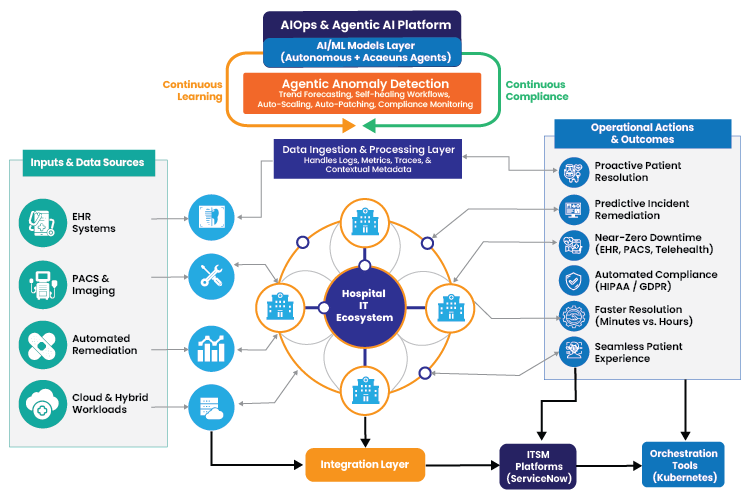


Ezhilvendan Selvam
5 Minutes read
AIOps Powered by Agentic AI: The Blueprint for Autonomous Healthcare IT
In today’s connected healthcare environment, thousands of clinicians rely on Electronic Health Record (EHR) systems, radiologists upload imaging scans, and patients engage in telehealth consultations simultaneously across hospital networks.
Now imagine a sudden slowdown in the EHR system — doctors can’t access patient histories, delaying critical decisions. Traditionally, IT teams respond reactively, searching through logs, restarting servers, or escalating support tickets in a race against time. But what if the hospital’s IT infrastructure could predict such issues hours in advance? What if it could automatically scale resources, resolve bottlenecks, and self-heal before clinicians even noticed a disruption?
This is where AIOps powered by Agentic AI comes in — transforming healthcare IT operations from reactive firefighting to proactive, autonomous resilience.
Why Now? The Strategic Timing of AIOps in Healthcare
Healthcare IT is at a critical inflection point, where increasing digital complexity meets the urgent demand for uninterrupted patient care. Several key forces are driving the need for AIOps adoption across healthcare organizations:
- Explosion of Digital Health: Telemedicine visits have surged 38x since 2019 (McKinsey). The proliferation of IoMT devices, AI-driven diagnostics, and connected medical systems has created massive data and IT dependency.
- Regulatory Pressures: Evolving compliance mandates such as HIPAA, GDPR, and emerging data residency regulations require continuous system availability, audit readiness, and governance.
- Patient Safety: Downtime in mission-critical systems such as EHR or PACS can delay diagnoses, disrupt clinical workflows, and impact patient outcomes directly.
- Cloud & Hybrid IT Growth: Hospitals are rapidly migrating workloads to cloud and hybrid environments, introducing new challenges in observability, integration, and operational management.
AIOps arrives at the right moment — bridging the gap between IT complexity and real-time patient care needs.
What is AIOps with Autonomous Agents?
AIOps (Artificial Intelligence for IT Operations) leverages AI and machine learning to analyze logs, metrics, and traces across complex IT ecosystems. When combined with Agentic AI, AIOps evolves beyond detection to autonomous, intelligent action — enabling systems to predict, prevent, and resolve issues in real time.
- Predictive Incident Detection: Forecast potential EHR slowdowns, PACS storage issues, or telemedicine bandwidth spikes before they occur.
- Automated Remediation: Instantly restart services, reallocate compute resources, or patch vulnerabilities without human intervention.
- Dynamic Scaling: Seamlessly handle sudden outpatient surges or seasonal flu peaks without disruption.
- Root Cause Analysis: Identify and map dependencies across hospital applications, IoMT gateways, and cloud workloads to isolate issues faster.
- Continuous Compliance: Maintain automated, real-time monitoring for HIPAA/GDPR adherence, ensuring audit readiness and governance integrity.
Business Impact: Transforming Healthcare IT Operations
AIOps powered by Agentic AI delivers tangible outcomes across operational efficiency, cost management, and patient care. It shifts healthcare IT from reactive support to a strategic enabler of clinical excellence.
- Always-On IT for Patient Care: With AI-driven predictive monitoring and automation, hospitals can achieve near-zero downtime for critical systems such as EHR, PACS, and telehealth platforms. Proactive resource scaling and automated remediation ensure uninterrupted continuity of care, even during periods of peak demand.
- Cost Efficiency: By implementing AI-powered resource optimization and workflow automation, healthcare providers significantly reduce manual troubleshooting efforts. This results in 20–30% IT cost savings, while dynamically aligning infrastructure capacity with real-time operational demand.
- Faster Resolution: AIOps enables rapid incident detection and autonomous self-healing, reducing resolution times from hours to minutes. Clinicians benefit from uninterrupted access to patient records and applications, improving care coordination and productivity.
- Enhanced Patient Experience: Reliable IT operations directly translate to shorter wait times, seamless telehealth sessions, and smoother clinical workflows. This creates a frictionless digital experience for both patients and healthcare professionals.
- Compliance: Automated monitoring and explainable AI frameworks ensure ongoing compliance with HIPAA and GDPR standards. Continuous system checks and transparent audit trails strengthen data governance, reduce audit risks, and maintain patient trust.
Technology Architecture Overview
AIOps in healthcare relies on a multi-layered, cloud-native architecture designed for observability, scalability, and intelligent automation.
- Data Ingestion Layer: Collects telemetry data (logs, metrics, traces) from EHRs, PACS, IoMT devices, and cloud workloads through APIs and observability agents.
- Processing Layer: Cleanses, normalizes, and enriches data with contextual metadata such as user sessions, workload priorities, and compliance parameters to enable accurate analysis.
- AI/ML Models Layer: Leverages machine learning algorithms for predictive anomaly detection, trend forecasting, and dependency mapping, providing insights across interconnected systems.
- Agentic AI Layer: Executes autonomous workflows such as auto-scaling, service restarts, vulnerability patching, and compliance enforcement, reducing manual intervention.
- Integration Layer: Seamlessly connects with IT Service Management (ITSM) platforms like ServiceNow and Jira, orchestration tools such as Kubernetes and Terraform, and key healthcare application APIs.

Key Benefits of AIOps with Autonomous Agents in Healthcare
- Zero Downtime for Critical Systems: Mission-critical platforms such as EHR, PACS, and telehealth remain continuously available through predictive monitoring and automated remediation. AIOps ensures that patient care workflows are never disrupted, even during system stress or traffic spikes.
- Regulatory Confidence: Automated compliance checks continuously monitor data privacy and security standards, ensuring alignment with HIPAA, GDPR, and other healthcare regulations. This proactive governance minimizes audit risks and strengthens compliance posture.
- Faster Incident Resolution: With AI-powered root cause analysis and self-healing, incidents are resolved in minutes instead of hours. Automated detection and response minimize downtime and help clinicians maintain uninterrupted access to critical applications.
- Lower Operational Costs: AIOps significantly reduces manual troubleshooting overhead, allowing IT teams to focus on innovation and optimization. By leveraging AI-based resource allocation, hospitals achieve measurable operational cost savings and improved infrastructure efficiency.
- Enhanced Patient Experience: Reliable and high-performing IT systems deliver seamless telehealth sessions, shorter wait times, and smoother clinical workflows. This translates into improved patient satisfaction and clinician productivity, reinforcing trust in digital healthcare platforms.
Challenges in Implementing AIOps in Healthcare
While AIOps bring transformative value, healthcare organizations must address specific challenges to ensure successful implementation and adoption.
- Data Security and Privacy: Protecting Protected Health Information (PHI) is paramount. AI-driven analytics must be deployed with robust encryption, access controls, and compliance frameworks to safeguard sensitive healthcare data.
- Legacy System Integration: Many hospitals still rely on legacy EHR and imaging platforms that lack modern API capabilities. Integrating AIOps with these systems requires custom connectors and middleware for seamless interoperability.
- Explainability and Trust: IT teams need full visibility into why autonomous actions are taken. Implementing explainable AI frameworks ensures transparency, builds trust, and enables human oversight of AI-driven decisions.
- Low-Latency Reliability: In healthcare, every second counts. AIOps systems must deliver real-time monitoring and remediation, self-healing within seconds to prevent service disruptions that could affect patient care.
Use Cases: AIOps Driving Measurable Impact in Healthcare
Automated EHR Incident Response
A leading hospital network experienced frequent EHR slowdowns during peak outpatient hours, delaying patient consultations and frustrating clinicians.
- Solution: The AIOps platform predicted performance stress on EHR systems, auto-scaled compute resources, and proactively restarted impacted services before disruptions occurred.
- Outcome: Achieved a 40% reduction in downtime and improved clinician throughput across outpatient departments.
Telemedicine Platform Resilience
A telehealth provider faced service disruptions during seasonal flu surges, as patient consultation volumes spiked dramatically.
- Solution: AIOps agents detected bandwidth and compute saturation early, automatically balanced workloads across multi-cloud clusters, and prevented outages.
- Outcome: Delivered 99.9% uptime during peak flu season, strengthening patient trust and platform reliability for remote care.
Automated Compliance & Security Patching
A healthcare IT team struggled to maintain HIPAA audit readiness while managing patch deployment across distributed systems.
- Solution: AIOps agents continuously monitored vulnerabilities, auto-applied critical patches, and logged all actions for transparent audit trails.
- Outcome: Enabled 70% faster patch deployment and reinforced compliance posture, significantly reducing audit risk.
Future Outlook: Towards Autonomous Healthcare IT
The next decade will redefine how healthcare IT operates, shifting from reactive system management to fully autonomous, AI-driven operations.
- Self-Healing EHR Systems: Platforms that automatically detect and correct performance issues before they impact clinicians.
- Autonomous Compliance Monitoring: Real-time enforcement of HIPAA/GDPR policies through intelligent AI agents.
- AI Copilots for CIOs: Real-time AI advisors providing actionable insights for proactive IT decision-making.
- AI-First Healthcare Infrastructure: Predictive, resilient, and patient-centric IT architectures built to adapt dynamically at scale.
Conclusion
The future of healthcare IT lies in autonomous intelligence — systems that anticipate, adapt, and act before disruptions occur. With AIOps powered by Agentic AI, healthcare providers can ensure continuous availability, regulatory compliance, and operational efficiency, ultimately improving patient outcomes and clinical productivity.
ACL Digital brings the expertise to turn this vision into reality, helping healthcare organizations build the IT backbone for next-generation patient experiences.
About ACL Digital
ACL Digital partners with hospitals, telehealth providers, and medical device companies to build AI-first IT operations platforms that enhance reliability, performance, and compliance. From predictive EHR monitoring to self-healing telehealth systems, ACL Digital combines deep healthcare expertise with advanced AI and cloud engineering. With cloud-native architectures, edge deployments, and a strong focus on regulatory alignment, we enable healthcare IT teams to confidently adopt autonomous AIOps for continuous availability and operational excellence.
Check out our case study on how ACL Digital transformed IT operations with an advanced AIOps solution.
Connect with ACL Digital’s Healthcare & AI experts to co-create secure, compliant, and resilient AIOps solutions that enable predictive, self-healing, and always-on IT infrastructure for the future of digital healthcare.
Related Insights



Top 5 Hard Truths About Your Governance Strategy

ETL Simplified: Storing and Transforming Data Fully Inside Databricks


